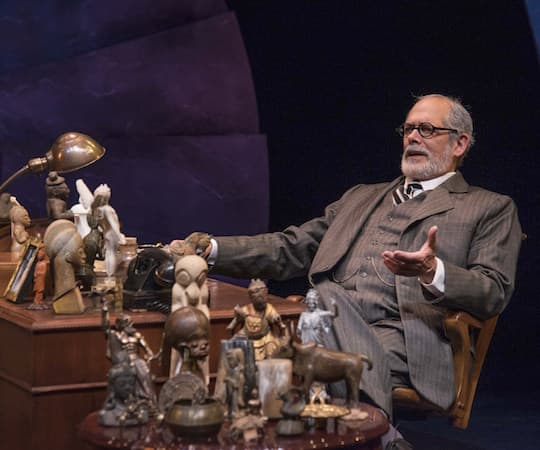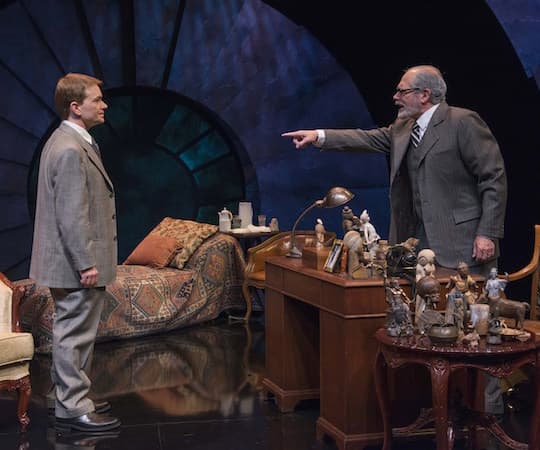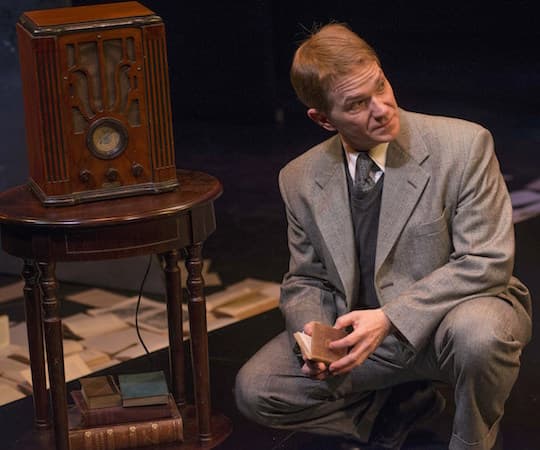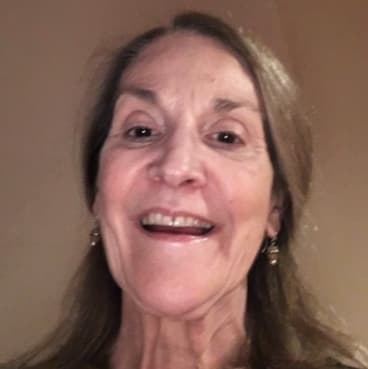Advertisement
Freud Debates C.S. Lewis In His 'Last Session' At New Rep

“Freud’s Last Session” is set in London in 1939, but it germinated at Harvard. There, for decades, Dr. Armand M. Nicholi Jr., clinical professor of psychiatry, taught a course called “The Question of God.” The syllabus contrasted the philosophy of Sigmund Freud, who worshiped at the altars of sex and science, with that of the Oxford don, Christian convert and famed children’s author C.S. Lewis. The long-running class became a book, and that tome “suggested” to playwright Mark St. Germain his well-articulated 2009 exercise in devil’s advocacy, “Freud’s Last Session,” which finds England on the brink of World War II, Freud at death’s door and Lewis 10 years from the threshold of Narnia.
Set in the study of the refugee shrink’s Hampstead home (now a museum), "Freud’s Last Session" debuted at Barrington Stage Company, where so many of St. Germain’s works have gotten their start that there is a stage named after him! The two-hander then advanced to a two-year stint Off Broadway and various regional productions. Now the psychoanalyst’s iconic couch, richly draped, has arrived, along with its atheistic owner and his God-advocating guest, at Watertown’s Arsenal Center for the Arts, where New Repertory Theatre’s incisive, well acted and visually arresting staging runs through May 22.

Unlike Michael Frayn’s “Copenhagen,” which imagines a meeting that did take place (between German physicist Werner Heisenberg and his mentor Niels Bohr in occupied Denmark in 1941), “Freud’s Last Session” is not rooted in any actual encounter. As far as we know, the 40ish Lewis never took tea with the dying Freud — and certainly not on Sept. 3, 1939, the day that, following Hitler’s invasion of Poland, Great Britain declared war on Germany. But conjuring such a meeting and pinpointing such a date does establish high stakes for a debate as to the existence of God. (It also allows for an ironic coda when, in the wake of all the existential fisticuffs, King George VI, in a radio address to the nation, “remits our course to God,” drawing a pained sigh from Freud.)
Freud has reached out to Lewis, himself once a non-believer, because, the psychoanalyst explains, he wants to know how an intelligent man can “embrace such an insidious lie.” Religious faith, in Freud’s view, is the “universal obsessional neurosis of humanity.” Lewis, for his part, offers a rational argument for believing in the Gospels: They are too clumsily written to be myths rather than reporting. “You were converted by bad storytelling?” Freud ripostes incredulously, going on to label Christ’s teachings “naïve and destructive.” Should the Poles turn the other cheek, he wonders?

In the course of St. Germain’s spirited sparring match, Freud and Lewis also bat around their own fathers, Freud’s collection of sacred artifacts, some slyly observed kinkiness in their respective personal arrangements, the mysteries of music, the uses of humor and the bad news of the day. Both characters wink at that analyst’s couch from time to time, and air raid sirens call forth the survival urge in believer and apostate alike.
As for human suffering, it is made vivid by Freud’s increasing discomfort due to the prosthetic upper-palate plate he calls “the monster.” In Lewis’ view, Man, rather than God, is the author of his pain, along with prisons, slavery and bombs. But tell that to Freud as he presses a bloody handkerchief to an excruciated mouth eaten away by cancer.

In matters of religion, “Freud’s Last Session” will change no one’s mind — though, for my money, the uber-analyst wins on points. But the dramatic dust-up is quick-witted and intellectually stimulating on both sides. And at New Rep, helmed by artistic director Jim Petosa, the play’s 80 minutes fly by. In Cristina Todesco’s imaginative set design, Freud’s lushly accoutered study floats between beaches of open books before what looks like a giant, refracted eye. Grainy World War II film footage evokes the historic moment and its attendant carnage.
The excellent actor Joel Colodner, neat in a three-piece woolen suit and watch chain, controlled even in his agony, is a formidable, formal yet pithy Freud. Shelley Bolman makes a gentler, impish but no less on-the-ball Lewis. Neither takes to the couch, alas, but they certainly hold the stage.
